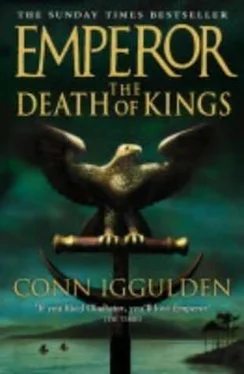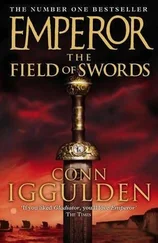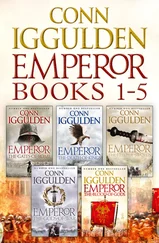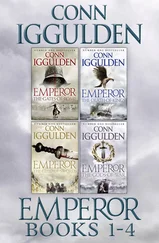Julius had marched abreast of a line about halfway back in Ventulus cohort for the best part of an hour. One of the veterans had caught his attention, the only one he passed not to meet his eye. The man had to have been one of the oldest there, hidden from easy sight by the bulk of the soldiers around him, which Julius guessed could be deliberate. Instead of a helmet, he wore the ragged skin of an old lion that covered his entire head and ended in a neatly sliced line at his shoulders. The dead cat's eyes were dark, sunken holes, and like its owner, the headgear looked too far gone to be useful. The old man marched while staring straight ahead, his eyes screwed up to wrinkled slits against the dust. Julius examined him with interest, taking in the hard lines of sinew that stood out in his neck and the swollen knuckles of his hands that looked more like clubs of bone than fingers. Though the veteran kept his mouth pursed shut, it was obvious from his sunken cheeks that there were few teeth left in the old jaw. Julius wondered what spirit could keep such an ancient marching through the miles, always staring toward a destination neither of them could see.
As noon approached and Julius was ready to call a halt for food and an hour of blessed rest, he saw the man develop a limp in his left leg and noted the knee had swollen in the short time he had been with him. He bellowed the halt and the Wolves crashed to a stop in two paces, together.
As Quertorus collected the cooking equipment, Julius found the old man sitting with his back to a stunted tree. His seamed face tightened as he bound the weak knee in a strip of cloth, winding on so many layers that it could hardly bend at all. He had removed the lion-head skin, placing it carefully to one side. His hair was wispy and gray, sticking to him in sweaty strands.
“What's your name?” Julius asked him.
The old man spoke as he wound the cloth, testing the movement and grunting in discomfort with each try. “Most of them call me Cornix, the old crow. I'm a hunter, a trapper in the forests.”
“I have a friend who could ease that knee for you. A healer. He's probably older than you are,” Julius said quietly.
Cornix shook his head. “Don't need him. This knee's taken me on a lot of campaigns. It will last one more.”
Julius didn't insist, impressed by the stubbornness of the man. Without another word, he fetched some of the warm bread and bean stew that Quertorus had heated through. It would be their last hot meal as they drew within scouting range of Mithridates and couldn't risk smoke being seen. Cornix took it, nodding his thanks.
“Strange sort of commander, you are,” he said through mouthfuls, “bringing me food.”
Julius watched him eat without replying for a moment.
“I'd have thought you would have left soldiering behind you. It must be, what, twenty years since you were with a legion?”
“More like thirty, and you know it,” the man replied, smiling to reveal a mash of unchewed bread. “Still miss it sometimes.”
“Do you have a family?” Julius asked, still wondering why the man wasn't safe in the hills instead of breaking the last of his strength with the others.
“They moved north and my wife died. Just me now.”
Julius stood and looked down at the placidly chewing figure, watching him wince as he flexed the bound knee. Julius's gaze strayed to where Cornix had rested his shield and sword against the tree, and the old man followed his eyes, choosing to answer the unspoken question.
“I can still use it, don't you worry.”
“You'll need to. They say Mithridates has a great host of an army.”
Cornix sniffed disdainfully. “Yes, they always say that.” He finished a mouthful of the stew and took a long pull from his waterskin. “Are you going to ask me, then?”
“Ask you what?” Julius replied.
“I could see it was eating you up all the time you was marching near me. What's a man of my age doing going to war? That was it, wasn't it? You were wondering if I could even lift that old sword of mine, I'd guess.”
“It crossed my mind.” Julius chuckled, responding to the gleam of humor in the dark eyes.
Cornix laughed with him, a long wheezing series of hard sounds. Then he fell silent and looked straight at the tall young commander with all the confidence of youth and all his life in front of him.
“Just to pay my debts, lad. That old city gave me a lot more than I gave back. I should think this last one'll make us even at the end.”
He winked as he finished speaking and Julius smiled faintly, realizing suddenly that Cornix had come with him to die, perhaps preferring a quick end to a lonely, drawn-out agony in some desolate hunter's cabin. He wondered how many of the others wanted to throw their lives away with the last of their courage, rather than wait for a death that crept up on them in the night. Julius shivered slightly as he walked back to the campfires, though the day was not cold.
***
There was no way to be sure where Mithridates camped with his irregulars. The reports Julius had from Roman survivors behind them could be mistaken, or the Greek king could have moved many miles while the Wolves were marching into the area. The biggest worry was that the two forces would stumble on each other's scouts and be forced into action before Julius was ready. His own scouts understood that all their lives depended on not being spotted, and Julius had the fastest and fittest of them traveling out for miles looking for fresh signs of the enemy while the bulk of the Wolves concealed themselves in the scrub woodland. It was a frustrating time. Forbidden fire and unable to hunt widely, they were cold and damp each night and barely warmed by the weak sun that came to them through the trees during the day.
After four days of inaction, Julius was practically ready to order the men into the open and take the consequences. All but three of his scouts had come in past the outer line of guards and were eating cold food with the others in miserable silence.
Julius chafed as he waited for the last three. He knew they were in the right area, having found a slaughtered Roman century stripped of armor and weapons only five miles to the east, caught unawares as they guarded a lonely fort. The bodies looked pitiful in death and no words Julius might have said could have fired his men's determination so thoroughly.
The scouts came in together, thudding through the wet leaves with the slow trot they used to cover miles without a rest. Ignoring the cold stew that waited for them, they came straight to Julius, their faces tired but animated with excitement. All three had been out for the whole four days, and Julius knew immediately that they had found the enemy at last.
“Where are they?” he asked, standing quickly.
“Thirty miles further west,” one replied, eager to get the news out. “It's a heavy camp. It looks as if they're preparing to defend against the legions coming from Oricum. They've dug in at a narrow point between two sharp slopes.” He paused for breath and one of the others took up the report without a pause.
“They've spiked the slopes and the ground to the west. They had a wide line of scouts and guards out, so we couldn't get too close, but it looked good enough to stop cavalry. We saw archers practicing and I think we saw Mithridates himself. There was a big man giving orders to his units. He looked like the one in command.”
“How many were there?” Julius snapped, wanting this detail more than all the rest.
The scouts glanced at each other and then the first spoke again.
“We think about ten thousand, at a rough guess. None of us could get close enough to be sure, but he had the whole valley between the hills covered in leather tents-maybe a thousand of them. We guessed at eight or ten men to each one…” The other two nodded, watching him to see how he took the news. Julius kept his face carefully blank, though he was disappointed. No wonder Mithridates felt confident enough to stand against the legionaries on their way to him. The Senate had sent only Sulla before against a smaller rebellion. If they sent one legion again, Mithridates could well be victorious, gaining himself another year before the Senate heard the news and dragged back every spare man from the other territories. Even then, they might be reluctant to leave the rest of Roman lands exposed. Surely they would not dare to lose Greece? Every Roman-held city that hid from the king behind high walls could be destroyed before the Senate finally gathered a crushing force. The rivers would run red before the last of Rome was cut from Mithridates' lands, and if he could unite all the cities, it could mean war for a generation.
Читать дальше
Конец ознакомительного отрывка
Купить книгу












